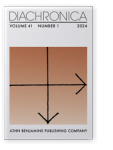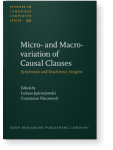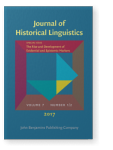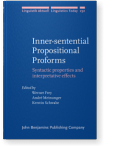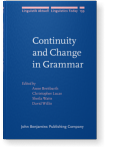Katrin Axel-Tober
List of John Benjamins publications for which Katrin Axel-Tober plays a role.
Journal
Title
Studies on Old High German Syntax: Left sentence periphery, verb placement and verb-second
Katrin Axel-Tober
[Linguistik Aktuell/Linguistics Today, 112] 2007. xii, 364 pp.
Subjects Generative linguistics | Germanic linguistics | Historical linguistics | Syntax | Theoretical linguistics
2023 Chapter 10. On the divergent developments of two German causal subjunctions: Syntactic reanalysis and the evolution of causal meaning Micro- and Macro-variation of Causal Clauses: Synchronic and Diachronic Insights, Jędrzejowski, Łukasz and Constanze Fleczoreck (eds.), pp. 269–310 | Chapter
This chapter discusses the development of two German causal subjunctions weil and zumal. In particular, it introduces a new proposal for the syntactic reanalysis of weil in the C0-position from a free relative clause. Later, weil-clauses also underwent a shift in meaning in the course of which… read more
2017 Evidential adverbs in German: Diachronic development and present-day meaning The Rise and Development of Evidential and Epistemic Markers, Cruschina, Silvio and Eva-Maria Remberger (eds.), pp. 9–47 | Article
This article addresses the semantic and morphosyntactic development of the German evidential adverbs offensichtlich, offenbar, anscheinend, and scheinbar ‘obviously’/‘apparently’/‘seemingly’ and their meaning contribution in present-day German. It will be argued that these expressions, most of… read more
2016 Correlative es vs. das in German: An empirical perspective Inner-sentential Propositional Proforms: Syntactic properties and interpretative effects, Frey, Werner, André Meinunger and Kerstin Schwabe (eds.), pp. 49–72 | Article
In the last few decades, the role of correlative elements in recursive sentence embedding has received considerable attention. In the theoretical literature on German, it has been argued that the syntax of correlative constructions is not homogeneous and that one has to distinguish between… read more
2010 What changed where? A plea for the re-evaluation of dialectal evidence Continuity and Change in Grammar, Breitbarth, Anne, Christopher Lucas, Sheila Watts and David Willis (eds.), pp. 13–34 | Article
In the field of generative diachronic syntax, it has often been disregarded at which level of the language (dialect or Standard) syntactic change has occurred. However, just as in the case of phonological developments, the syntax often (though not always) turns out to be more conservative at the… read more
